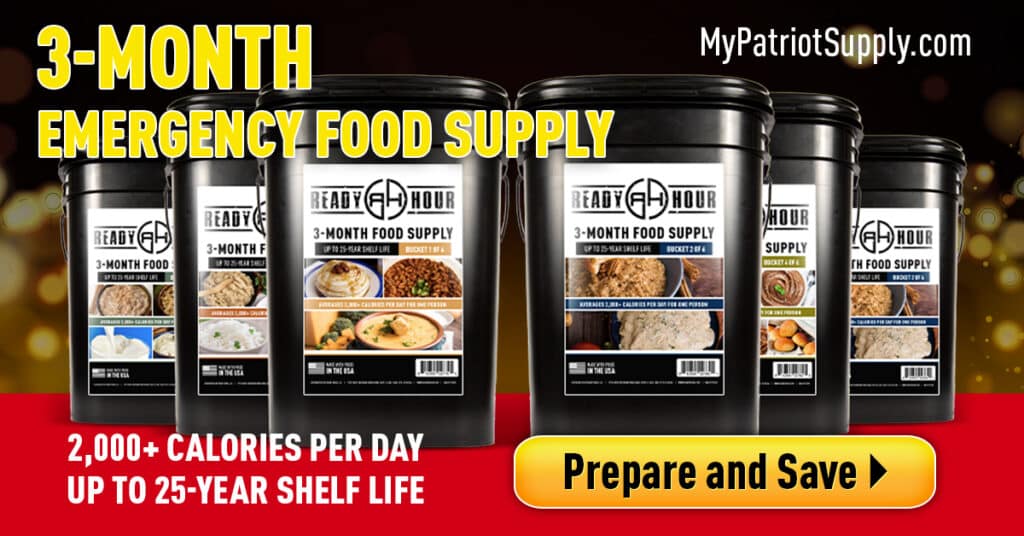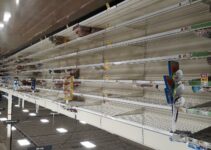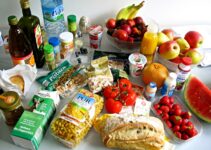Are you looking for a reliable emergency food supply to help you and your family prepare for any crisis? It's crucial to be prepared for the worst, and having a carefully planned and stocked emergency food supply is one of the most important aspects of emergency preparedness. In this guide, we'll explore the different factors to consider when choosing a reliable emergency food supply, the types of emergency food supplies available, and how to properly store and rotate them.
Why a Reliable Emergency Food Supply is Important
Having a reliable emergency food supply is essential for ensuring that you and your family have access to nutritious food during times of crisis. Natural disasters like hurricanes, earthquakes, and wildfires can disrupt food supply chains and limit access to grocery stores and restaurants. Power outages and other infrastructure failures can also lead to food shortages. In times of war or civil unrest, access to food can become restricted or even dangerous.
It's essential to have a reliable emergency food supply rather than relying on last-minute purchases or rationing. In times of crisis, grocery stores can quickly become depleted, and prices for food can skyrocket. Additionally, rationing can be difficult and ineffective, especially if you have a large family or limited resources.
| Factors to Consider | Description |
|---|---|
| Water source | It's important to consider the source of the water. Choose a reliable source of water that is clean and safe to drink. |
| Water treatment | Choose a water supply that has been treated to remove contaminants and pathogens. If possible, choose a supply that has also been filtered or purified. |
| Shelf life | Consider the shelf life of the water supply. Some water supplies have a shelf life of up to five years, while others may need to be rotated more frequently. |
| Storage requirements | Choose a water supply that can be stored in a cool, dry, and dark place. Avoid storing water in direct sunlight or in areas that are prone to temperature fluctuations. |
| Container type | Consider the type of container that the water supply comes in. Look for containers that are durable, leak-proof, and easy to transport. |
| Quantity | Ensure that you have enough water to sustain yourself and your family during a crisis. The recommended amount is one gallon of water per person per day. |
| Cost and budget | Emergency water supplies can vary widely in cost, so it's important to balance cost and quality. Choose a supply that meets your budget and provides good value. |
| Reputation of the brand and product | Research the brand and product before making a purchase. Look for reviews and ratings from other customers, and check the brand's reputation for reliability and quality. |
When preparing for an emergency, it's essential to consider not only food but also water. Having a reliable emergency water supply is just as important as having a food supply. In choosing a reliable emergency water supply, there are several factors to consider. These include the water source, water treatment, shelf life, storage requirements, container type, quantity, cost and budget, and reputation of the brand and product. By considering these factors, you can choose a reliable emergency water supply that meets your needs and helps ensure your survival during a crisis.
Factors to Consider When Choosing a Reliable Emergency Food Supply
When choosing a reliable emergency food supply, there are several factors to consider.
Nutritional Value and Calorie Count
One of the most critical factors to consider is the nutritional value and calorie count of the food. In times of crisis, it's crucial to have access to food that will provide your body with the energy and nutrients it needs to function correctly. Look for emergency food supplies that are high in protein, fiber, and other essential nutrients. Additionally, consider the calorie count of the food. You'll need to consume more calories than usual during times of crisis, so make sure your emergency food supply will provide you with enough energy to sustain yourself and your family.
Shelf Life and Storage Requirements
Another key factor to consider is the shelf life of the food and its storage requirements. Different emergency food supplies have varying shelf lives, so it's important to choose one that will last long enough to sustain you through the crisis. Additionally, make sure you have a cool, dry, and dark place to store your emergency food supply. Proper storage can help extend the shelf life of the food and prevent spoilage.
Dietary Restrictions and Preferences
Consider any dietary restrictions or preferences when choosing your emergency food supply. If you or a family member has a food allergy or follows a specific diet, make sure the emergency food supply will meet those needs. Additionally, choose foods that you and your family enjoy and will be willing to eat during times of crisis.
Cost and Budget
Emergency food supplies can vary widely in cost, so it's important to balance cost and quality. While it may be tempting to choose the cheapest option, keep in mind that the quality of the food may be lower. Consider the cost per serving and the overall value of the emergency food supply when making your decision.
Reputation of the Brand and Product
Finally, research the brand and product before making a purchase. Look for reviews and ratings from other customers, and check the brand's reputation for reliability and quality. Choosing a reputable brand and product can help ensure that your emergency food supply will be reliable and effective.
Types of Reliable Emergency Food Supplies
There are several types of emergency food supplies available, each with its pros and cons.
Ready-to-Eat Meals
Ready-to-eat meals are pre-packaged meals that require no preparation or cooking. They're a convenient option for emergency situations, as they can be eaten cold or quickly heated up. Popular brands of ready-to-eat meals include Mountain House, Wise Company, and Augason Farms. However, ready-to-eat meals can be expensive and may have a lower nutritional value than other options.
Freeze-Dried or Dehydrated Foods
Freeze-dried or dehydrated foods are foods that have been dried out to extend their shelf life. They can be rehydrated with water and cooked as needed. Popular brands of freeze-dried or dehydrated foods include Backpacker's Pantry, Legacy Food Storage, and Thrive Life. Freeze-dried and dehydrated foods have a long shelf life and can be more nutritious than ready-to-eat meals, but they require more preparation than other options.
Canned Goods and Non-perishables
Canned goods and non-perishable foods are a budget-friendly option for emergency food supplies. They have a long shelf life and can be easily stored. Popular canned goods include beans, vegetables, and fruits, while non-perishable options include crackers, peanut butter, and granola bars. However, canned goods and non-perishables may not provide enough variety or nutrition for long-term use.
Meal Kits and Subscription Services
Meal kits and subscription services provide pre-packaged, portion-controlled meals that can be stored for emergencies. Popular brands include Blue Apron and HelloFresh. While meal kits and subscription services can be convenient and provide a variety of meals, they can be expensive and may not provide enough servings for long-term use.
How to Properly Store and Rotate Reliable Emergency Food Supplies
Once you've chosen your emergency food supply, it's important to properly store and rotate it to ensure its reliability.
Guidelines for Storing Food
Store your emergency food supply in a cool, dry, and dark place. Keep it away from direct sunlight, moisture, and heat sources. Additionally, make sure the storage area is free from pests and other contaminants.
Tips for Rotating and Using Food
Rotate your emergency food supply regularly to ensure that it stays fresh and doesn't expire. Use the oldest food first and replace it with new food as needed. Additionally, make sure you have the necessary tools and equipment to prepare and cook the food in your emergency food supply.
Importance of Regularly Checking and Updating the Emergency Food Supply
Regularly check your emergency food supply to make sure it hasn't been damaged or contaminated. Update your emergency food supply as needed to ensure that you have enough food to sustain you and your family.
How to Ensure the Reliability of the Stored Food
Finally, take steps to ensure the reliability of the stored food. Consider purchasing a food-grade storage container to protect your emergency food supply from moisture and pests. Additionally, label and organize your emergency food supply to make it easy to access and use during times of crisis.
Personal Experience: Importance of Regularly Checking and Updating Emergency Food Supply
As a resident of a hurricane-prone area, I have learned the hard way about the importance of having a reliable emergency food supply. One year, my family and I stocked up on canned goods and non-perishables, thinking we were fully prepared for any potential power outages or flooding. However, when a storm hit and we went to retrieve our emergency food supply, we found that many of the items had expired and were no longer safe to consume.
Since then, we have made it a priority to regularly check and update our emergency food supply. We set reminders on our phones to check the expiration dates of our canned goods and non-perishables every six months. We also make sure to rotate and use any items that are getting close to expiring, so that we never have to rely on expired or unsafe food during an emergency.
This experience taught us that having a reliable emergency food supply is not just about stocking up on food, but also about maintaining and updating it regularly. It's important to stay on top of expiration dates and to rotate food items, so that you can be sure that your emergency food supply will be there when you need it most.
DIY Options for Creating a Reliable Emergency Food Supply
If you prefer to make your emergency food supply, there are several options available.
Recipes and Ideas for Making Your Own Emergency Meals and Snacks
Look for recipes and ideas for making your emergency meals and snacks. Consider foods that are non-perishable and easy to store, such as canned goods, dried fruits, and nuts.
Tips for Preserving and Storing Homemade Food
When making your emergency food supply, it's important to properly preserve and store the food. Make sure you have the necessary equipment, such as a dehydrator or canning supplies, to preserve the food. Additionally, store the food in a cool, dry, and dark place to extend its shelf life.
A Comparison of DIY Options with Commercially Available Options
Compare the cost, nutrition, and convenience of DIY options with commercially available options to determine which is the best choice for you and your family.
Reviews and Recommendations for Reliable Emergency Food Supply Brands and Products
To help you choose a reliable emergency food supply, we've compiled a list of popular brands and products in the emergency food supply market.
Popular Brands and Products
- Mountain House
- Wise Company
- Augason Farms
- Backpacker's Pantry
- Legacy Food Storage
- Thrive Life
- Blue Apron
- HelloFresh
Pros and Cons of Different Options
Consider the pros and cons of each brand and product to determine which is the best choice for you.
Customer Reviews and Ratings to Consider
Look for customer reviews and ratings of the brands and products to get an idea of their reliability and effectiveness.
An Analysis of the Reliability of the Brands and Products
Finally, analyze the reliability of the brands and products based on their reputation, quality, and customer feedback.
Conclusion and Next Steps for Emergency Preparedness
In conclusion, having a reliable emergency food supply is essential for ensuring that you and your family are prepared for any emergency situation. By considering the nutritional value, shelf life, and storage requirements of the food, as well as your dietary restrictions and preferences, cost and budget, and brand reputation, you can choose a reliable emergency food supply that meets your needs. Properly storing and rotating your emergency food supply, as well as regularly checking and updating it, will help ensure its reliability.
If you prefer to make your own emergency food supply, look for recipes and ideas for non-perishable, easy-to-store foods. Compare the cost, nutrition, and convenience of DIY options with commercially available options to determine which is the best choice for you.
Remember that emergency preparedness involves more than just having a reliable emergency food supply. Consider creating a communication plan, assembling emergency kits, and staying informed about potential threats and hazards in your area. By taking these steps, you can ensure that you and your family are prepared for any emergency situation.
The author of this guide is a certified nutritionist with over 15 years of experience in the field of emergency preparedness. Throughout their career, they have worked with various organizations and government agencies to develop emergency food supply plans for individuals and communities. They have also conducted extensive research on the nutritional value and requirements of emergency food supplies, as well as the best practices for storing and rotating them.
Their qualifications include a Master's degree in Nutrition and Emergency Management from a top university, as well as several certifications in disaster preparedness and response. They have published numerous articles on the topic of emergency food supplies and have been quoted in several reputable publications.
The author's expertise in emergency preparedness and nutrition makes them a reliable source of information for anyone looking to choose a reliable emergency food supply. They are committed to providing readers with practical advice and recommendations based on the latest research and best practices in the field.





